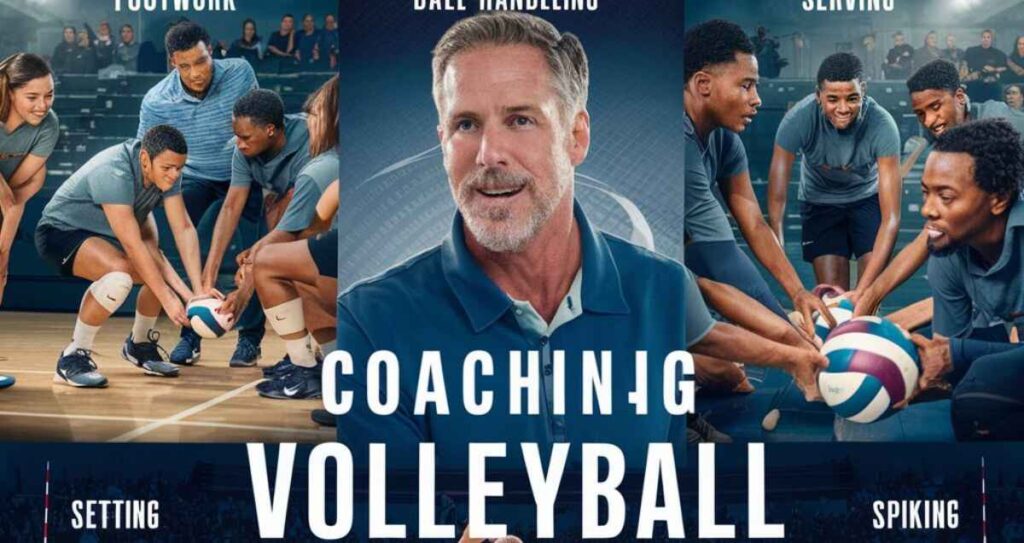Coach volleyball involves guiding players in developing their skills, understanding game strategies, and fostering teamwork. A successful coach focuses on creating a positive environment, where athletes can learn, improve, and enjoy the sport.
Are you ready to inspire your team and elevate their volleyball skills? Coaching volleyball is more than just teaching techniques; it’s about building confidence, teamwork, and a love for the game. Let’s explore how to become an effective volleyball coach!
Effective coaching requires a deep understanding of volleyball fundamentals and the ability to communicate them clearly. Coaches must prioritize key skills such as serving, passing, and teamwork while creating engaging practice plans tailored to their players’ needs.
Understanding the Game

Before you can effectively coach volleyball, it’s essential to understand the game’s rules, strategies, and dynamics. Familiarize yourself with:
- Basic Rules: Know the rules of the game, including scoring, rotations, and fouls. This knowledge will help you explain the game to your players.
- Positions and Roles: Understand the different player positions—setter, outside hitter, middle blocker, libero, and defensive specialist—and their responsibilities on the court.
- Game Strategies: Learn basic offensive and defensive strategies, including formations like 5-1 or 6-2 systems, to guide your team effectively during matches.
Setting Up a Practice Plan
Creating a structured practice plan is crucial for player development. Here’s how to do it:
- Define Goals: Establish short-term and long-term goals for your team, focusing on skill development, teamwork, and game strategy.
- Time Management: Allocate specific time slots for each drill, ensuring a balanced focus on different skills and game strategies.
- Variety of Drills: Include a mix of skill-building, conditioning, and scrimmage sessions to keep practices engaging and effective.
Sample Practice Schedule
| Time | Activity | Focus Area |
|---|---|---|
| 0:00-0:10 | Warm-up | Physical Conditioning |
| 0:10-0:30 | Passing Drills | Ball Control |
| 0:30-0:50 | Serving Practice | Service Techniques |
| 0:50-1:10 | Scrimmage | Game Situation |
| 1:10-1:20 | Cool Down | Recovery |
Key Skills to Focus On
As a coach volleyball, you should prioritize developing the following essential skills in your players:
- Serving: Teach proper serving techniques, including underhand, overhand, and jump serves. Emphasize consistency and accuracy.
- Passing: Focus on forearm passing and overhead passing. Encourage players to communicate effectively when receiving serves.
- Setting: Train players in hand positioning and footwork for effective setting. Proper technique is crucial for creating scoring opportunities.
- Hitting: Work on attack approaches, timing, and swing mechanics. Players should learn to recognize defensive formations and adjust their attacks accordingly.
- Defense: Teach proper digging and blocking techniques. Instill a sense of anticipation to help players react quickly to opponents’ actions.
Drills for Player Development
Incorporating a variety of drills can enhance players’ skills and teamwork. Here are some effective drills:
Passing Triangle
Objective: Improve passing accuracy and communication.
- Set up three players in a triangle formation.
- The player in the middle passes the ball to each player in turn.
- Emphasize footwork and calling for the ball.
Serving Accuracy
Objective: Enhance serving skills and consistency.
- Set up targets on the opposite side of the court.
- Players take turns serving, aiming for the targets.
- Track progress and celebrate improvements.
Controlled Scrimmage
Objective: Apply skills in a game-like situation.
- Divide players into teams and play a controlled scrimmage.
- Stop play to provide feedback on skills and strategies as needed.
- Focus on teamwork and communication during gameplay.
Building Team Dynamics
Fostering a positive team environment is key to success:
- Team Meetings: Hold regular team meetings to discuss goals, strategies, and team dynamics. Encourage open communication.
- Team Building Activities: Incorporate fun activities outside of practice to strengthen relationships among players. This helps create trust and camaraderie.
- Conflict Resolution: Address conflicts promptly and constructively, promoting a healthy and supportive team atmosphere.
Communication and Motivation
Effective communication is essential in coaching:
- Clear Instructions: Use clear and concise language when explaining drills and strategies. Visual demonstrations can enhance understanding.
- Positive Reinforcement: Acknowledge individual and team successes to boost morale. Celebrate improvements, big and small.
- Feedback: Provide constructive feedback to help players develop. Focus on what they did well and areas for improvement.
Conclusion
How To Coach Volleyball? is a fulfilling journey that combines strategy, skill development, and team dynamics. By understanding the game, setting clear practice plans, and fostering a positive team environment, you can effectively guide your players to success.
Remember, the goal is not just to win matches but to develop well-rounded athletes who enjoy the game. Embrace the challenge, and watch your team grow both on and off the court!
David Mark is a passionate sports writer and the voice behind SportsJourney. With a deep love for athletics and extensive knowledge across various sports, David delivers engaging content and expert analysis. His articles cover everything from game strategies and player profiles to sports news and commentary, providing readers with insightful and exciting perspectives on the world of sports.

